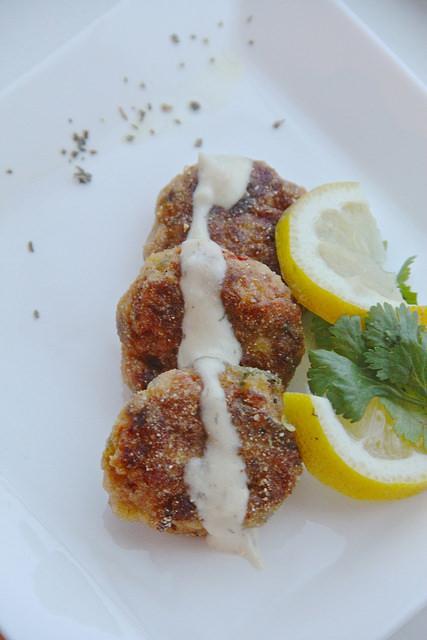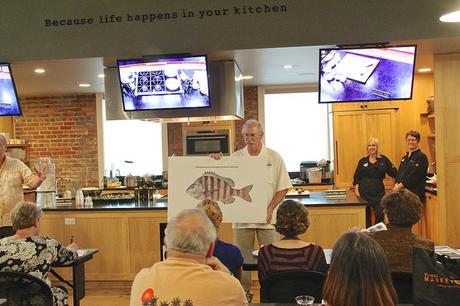
Recently, I was asked to appear on our local Gulf Coast television station that covers Destin, Florida to Mobile, Alabama, called BLAB TV, to discuss sustainable seafood, followed by participating as a speaker with a cooking presentation of Sheepshead at So Gourmet Pensacola, later in the week.
I was working with FloridaMarketMaker.com and UF|IFAS Extension, to get the word out about the wonderful delicacies of our Gulf that are called “underutilized species”, but like it or not, many still call them trash fish.
Living on the Gulf Coast for well over 40 years and preaching coastal cuisine, consuming a diet of mainly seafood, feeding it to my family as well, not to mention being formerly married to a man whose background for generations has been the shrimping, fishing and the restaurant industry, this was right up my alley.

The revolution of using underutilized species has been a breath of fresh air, not just because it takes pressure off the traditionally targeted fish, but it is exciting to see new selections on dining menus in restaurants. Many food enthusiasts can be small-minded, thinking the only fish worth eating are red snapper, grouper and flounder for example.
What I found from talking to people, was that most folks just don’t understand what sustainability really means when it comes to seafood, or how to shop for it. And, that bycatch is not the same thing. If not monitored, bycatch can impact the larger ecosystem in an unsustainable way.
By definition, a resource is considered sustainable when, through thoughtful practices, it is sure to be available for use in the future. When it comes to the bountiful seafood in our Gulf of Mexico waters, sustainability means taking care to never harvest more than our ecosystem can replace. A sustainable fishery ensures the livelihoods of those who depend on the Gulf’s aquatic resources by safeguarding everything needed for fish to survive and thrive. Fortunately, due to our warm waters in the Gulf, many of our species repopulate quickly.

Efforts of organizations like the Audubon Nature Institute’s G.U.L.F. program (Gulf United for Lasting Fisheries) are valuable, not just to our industry, but the Gulf ecosystem as a whole.
Audubon G.U.L.F., which services all five states in the Gulf Coast, uses Marine Advancement Plans (MAPs) to provide a hands-on approach to sustainability efforts while working with the community throughout the process.
These MAPs follow an eight-step strategy that involves identifying fisheries in need, assigning a committee to collect data and put together a plan, and implementing and monitoring the procedures. Management agencies and industry members provide input and insight throughout the process to ensure positive change.
Here are a few tips for shopping:
Look for sustainable seafood choices by selecting foods that have been produced and sourced in ways that do not disturb or negatively impact our food systems, and always purchase from a reputable source.
Use your local fishmonger, and ask questions at your seafood market.
Use reputable online sources offering sustainably sourced seafood such as Wood’s Fisheries, and those using the IQF (individually quick frozen) system on their fishing vessels.
Sign up for Monterey Bay Seafood Watch.
Research the fish you want to cook before heading to the store, and have a back up plan if the fish is not available, or not to your liking. It should not be be stinky, but smell of the fresh ocean.
To reiterate, always ask. A restaurant, reputable seafood shop, wholesaler or local fishmonger, should be able to tell you where your fish came from and how it was sourced. If they can’t, run, don’t walk in the other direction!
For this recipe, we chose Sheepshead to work with as a collaborative effort, and Sue Shattuck at So Gourmet prepared the presentation. I’m not certain why it is called Sheepshead, but it survives on my favorite foods of crustaceans and bivalves, and lives by jetties, pilings, piers or rocky bottoms if fishing for it. Pretty and striped on the outside, when a Sheepshead opens its mouth you may be horrified by its rows of human like teeth, but believe me, this is a delicate white fish to be savored.
Sheepshead Cakes
Sue Shattuck
Remoulade
1/3 cup light mayonnaise
1 tablespoon chopped capers
1 tablespoon fresh lemon juice
1/4 teaspoon liquid hot pepper sauce
Sheepshead Cakes
1 pound Sheepshead fillets
1/2 cup yellow cornmeal
1/4 cup packaged seasoned bread crumbs
3/4 teaspoon salt
1 red bell pepper, finely diced
3 scallions, finely chopped
1 teaspoon Cajun seasoning
1/4 teaspoon black pepper
2 tablespoons fresh lemon juice
1 egg white
3 tablespoons vegetable oil
Preparation
For sauce: Mix mayonnaise, capers, lemon juice and pepper sauce in bowl. Cover and refrigerate.
For cakes: Pulse Sheepshead in food processor until coarsely chopped. Mix cornmeal, crumbs and 1/4 teaspoon salt in small bowl. Add 1/2 cup cornmeal mixture to Sheepshead in processor; reserve remainder for coating. Add red pepper, scallions, Cajun seasoning, black pepper, lemon juice, egg white and remaining 1/2 teaspoon salt to processor. Pulse until evenly combined, about 30 seconds. Shape mixture into 2-inch patties, 2 tablespoons each. Coat in remaining cornmeal mixture. Heat oil in large nonstick skillet over medium heat. Without crowding, cook cakes in batches for 3 minutes, until light golden. Flip over after cooking 1-2 minutes minutes, and cook for another 1-2 minutes. Serve warm with remoulade.

